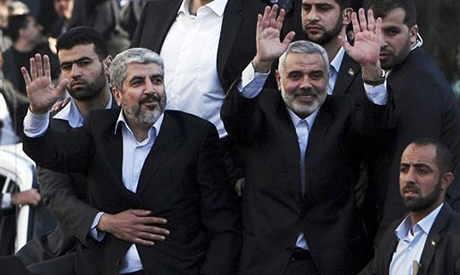 The Cairo Court for Urgent Matters has banned all activities in Egypt by Hamas pending a court verdict in an espionage case involving ousted president Mohamed Morsi and members of the Islamist Palestinian group.
The Cairo Court for Urgent Matters has banned all activities in Egypt by Hamas pending a court verdict in an espionage case involving ousted president Mohamed Morsi and members of the Islamist Palestinian group.
The court also banned all "organisations or groups branching from, financed or supported by Hamas," a judicial source told Ahram Online.
Hamas was prompt to criticise the ruling, saying that it "strongly condemned" what it described as an "unjustifiable" and "highly political" decision that was based on "fabrications and false news."
"Hamas has neither activities nor official offices in Egypt, whether before, during or after the [2011 revolution]," a Hamas official said in a statement e-mailed to Ahram Online.
"The decision targets the Palestinian people … and is consistent with goals to fight and eliminate the Palestinian resistance against which Hamas is a bulwark," the official added.
Hamas -- the Palestinian Islamist Resistance Movement -- is an ideological offshoot of the now-banned Egyptian Muslim Brotherhood. It was founded in 1987 at the height of the first Palestinian intifada against Israel.
The relationship between the group, which has controlled the Gaza Strip since 2006, and the Egyptian authorities has soured since the ouster of Muslim Brotherhood president Mohamed Morsi in July 2013.
Egyptian officials have accused Hamas of providing support to Islamic militants who have increased their fatal attacks on security forces in the Sinai Peninsula since Morsi's ouster. Hamas has repeatedly denied any such involvement.
Egyptian authorities have also accused several Hamas members of undermining national security by involvement in a series of jailbreaks at the beginning of the Egyptian revolution in January 2011.
Authorities have also charged former president Morsi of espionage with Hamas officials.
Thirty-six Muslim Brotherhood members, including Morsi, are currently being prosecuted for charges of espionage. The prosecution accuses the Brotherhood members of collaborating with Gaza rulers Hamas, Lebanese Shia group Hezbollah and other organisations "inside and outside" Egypt to smuggle arms, organise military training for group members in the Gaza Strip, and funding a scheme to stir chaos and threaten national security in Egypt.
Hamas has also denied any involvement in prison breaks or illegal cooperation with the ousted Islamist leader.
The group said on Tuesday it had been a subject of an "unprecedented media and political campaign of incitement and defamation" in Egypt.
Shortly after the Egyptian government declared the Muslim Brotherhood a terrorist group in December 2013, an Egyptian lawyer, Samir Sabry, filed a legal complaint with the court asking it to declare Hamas a terrorist organisation.
Tensions between Hamas and the Egyptian authorities have also been exacerbated by Egypt's campaign to destroy tunnels providing vital gas and food supplies to 1.7 million Palestinians in the Gaza Strip, which has been under Israeli siege since 2007, as well as frequent closures of the Rafah crossing into the strip.
Egypt says it has destroyed near 1,300 tunnels on its borders with Gaza since January 2011.
Last week, Hamas organised a sizeable rally on the Palestinian side of the crossing to demand Egypt opens the vital access point on a permanent basis.
The Islamist group maintains a hostile attitude towards Fatah, the main faction in the Palestine Liberation Organisation, which controls the occupied West Bank.
Ahram Online asked Egyptian foreign ministry spokesperson Badr Abdel-Ati to reflect on the repurcussions of the court ruling on Egyptian-Palestinian relations.
However, Abdel-Ati said "The Egyptian judiciary is independent and I cannot comment on the case."
Egypt has repeatedly declared its support for the right of the Palestinians to establish an independent state in the West bank and Gaza with East Jerusalem as its capital.
Cairo maintains that its decisions to close down the Rafah crossing stems solely from security considerations related to the ongoing Islamic militant insurgency in Sinai.



